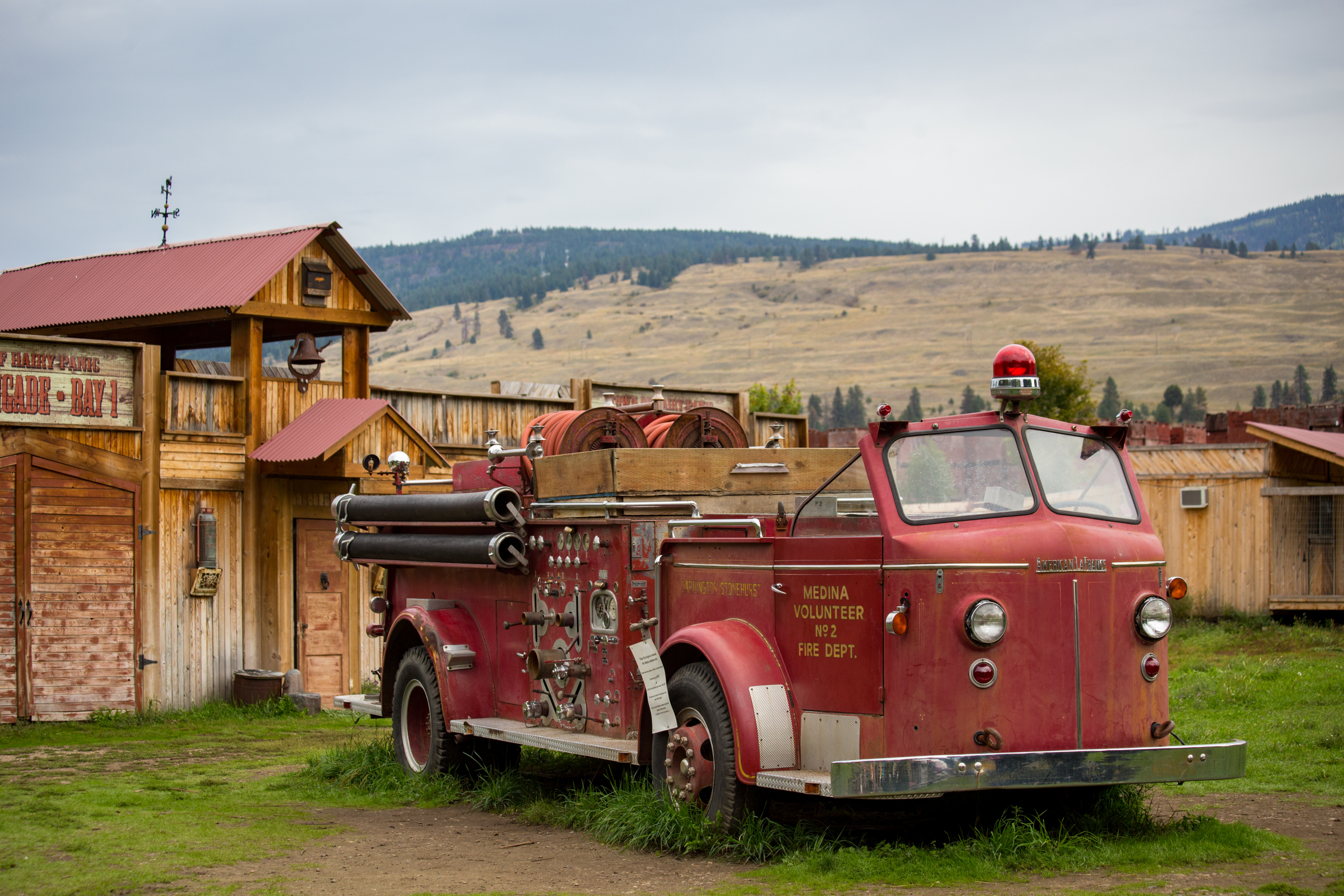
Antique Firefighting Memorabilia: Preserving Safety History

Antique Firefighting Memorabilia: Preserving Safety History
Introduction to Antique Firefighting Memorabilia
Explore captivating world of antique firefighting memorabilia, a collection aimed at preserving the legacy of fire safety. This unique category unveils a trove of historical firefighting antiques and collectibles, including fire trucks, equipment, and badges from various fire departments.
Each piece not only narrates a story of bravery, innovation, and the transformative journey of the firefighting profession but also serves as a homage to the firefighters who have played pivotal roles in rescue missions and safeguarding communities across generations.
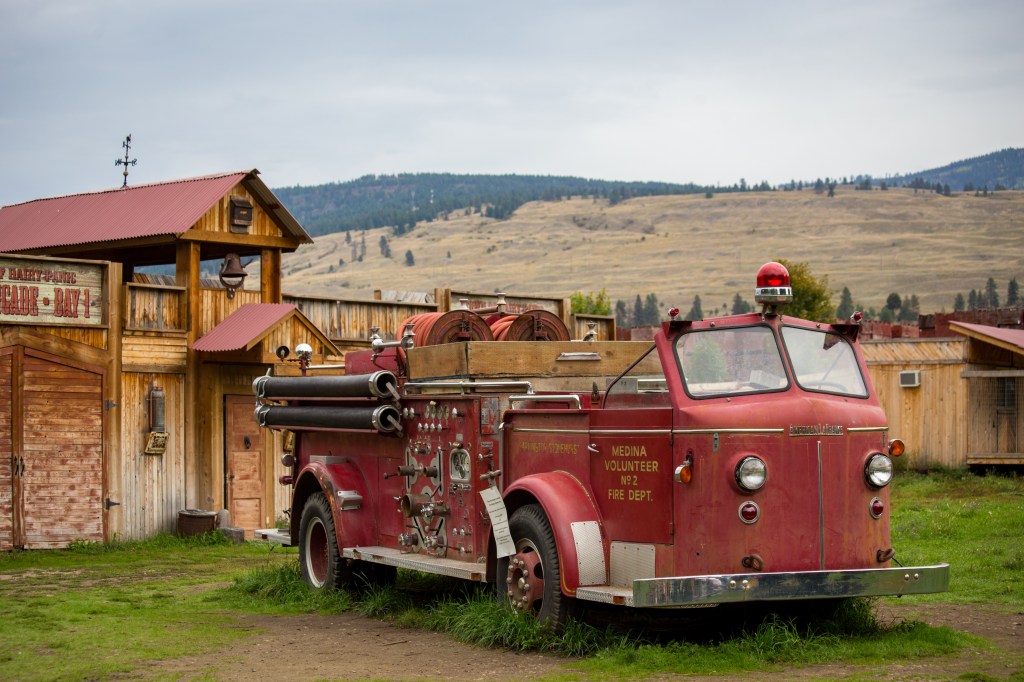
The Evolution of Firefighting Equipment
The evolution of firefighting antiques is a deep dive into the ingenuity and determination that have driven the advancement of fire safety measures. In the early days, manual tools were the backbone of firefighting efforts. Firefighters, relying on physical strength, used these basic implements to combat blazes that threatened lives and property. This era, while primitive by today’s standards, laid the groundwork for the sophisticated technologies employed by modern fire departments.
As fire departments evolved, so did the equipment they used. Companies specializing in firefighting gear began to innovate, creating more effective and efficient tools that would allow firefighters to do their jobs more safely and effectively. This period of innovation was crucial; it not only marked the transition from manual to mechanical firefighting methods but also signified a broader commitment to enhancing public safety.
As we delve into the tools and technologies that have shaped the modern fire department, the importance of this evolution becomes clear. It is not just about the advancements themselves, but about how these advancements have allowed firefighters to save more lives and protect more property than ever before.
Historical firefighting tools
- Badges: in response to the challenges posed by a rowdy scene gathering at fire lines, officials implemented a new measure requiring firefighting badges to be worn at all times. This policy was put into place to ensure the safety and accountability of the firefighters amid the chaos. Each badge was uniquely designed with a number to maintain accurate identity records, allowing for better coordination and control during emergency responses. The design, shape, and variation of these badges varied across fire companies, reflecting the distinct identity of each firefighting unit while promoting uniformity.
- Buckets: the use of leather buckets dates back to the beginning of American history. In the colonial period, buildings made of wood were common, which made them fire hazards. Early laws in New York mandated homes with at least 2 chimneys have a bucket close to the front door in case of a fire. These leather buckets held up to 3 gallons of water, and homeowners were required to have their names on them, with some even decorating their buckets. Today, leather buckets are highly valued by collectors as folk art pieces.
- Fire helmets: In 1740, firefighting safety took a significant leap with the creation of the first fire helmet, crafted from leather. This innovation marked the beginning of an evolutionary path aimed at maximizing firefighters’ protection. As technology and materials advanced, fire helmets underwent transformative changes, such as the integration of iron wire along the edge. This enhancement affirmed their structural integrity and improved their resistance to heat, setting a higher standard for safety.
- Fire trucks: The first fire engines were innovative machines powered by human strength, requiring between 10 and 20 individuals to operate effectively. Their main function was to stream water toward the site of flames, representing a leap forward in emergency response capabilities. With the advent of steam technology, the fire engine evolved into the steam engine fire truck, leading to the iconic fire truck.
- Trumpets: These instruments have played a pivotal role in firefighting history. Trumpets were initially used as a communication tool to signal the location of a fire and to rally volunteers. There were two types: work horns, made of brass and nickel, used at fires, and presentation horns, made of sterling silver with a decorative tassel, used at parades and social events.
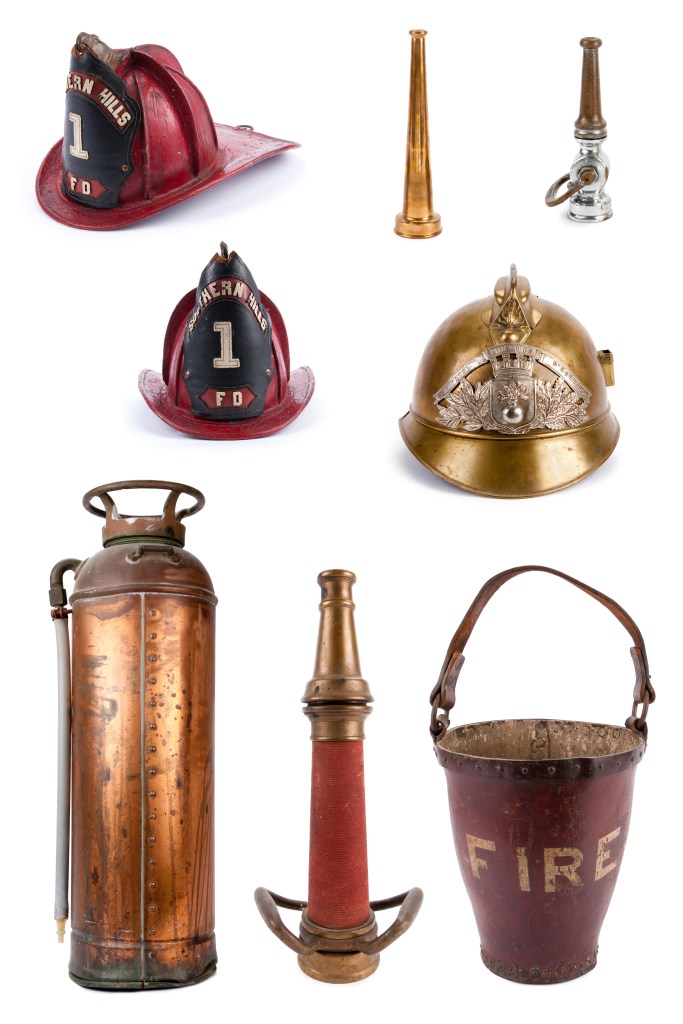
Collecting Vintage Firefighting Collectibles
Venturing into the world of vintage firefighting memorabilia is both intriguing and rewarding. If you’re starting on this journey as a beginner, it is crucial to understand the essentials of collecting vintage firefighting memorabilia.
Collecting vintage firefighting tools and gear
For beginners, it’s important to start with research. Familiarize yourself with the different types of vintage firefighting memorabilia that people collect. These can range from antique fire helmets and nozzles to vintage firefighting toys and photographs. Knowing what interests you the most can help you narrow down your focus, making your collecting journey more enjoyable and manageable.
Networking with other collectors can also be invaluable. Joining clubs or online forums dedicated to collecting vintage firefighting memorabilia can provide a wealth of knowledge and resources for your collectibles. It’s a great way to discover rare finds, exchange tips with fellow enthusiasts, and keep abreast of market trends.
Finally, whether you’re just starting or have been collecting for years, it’s important to enjoy the journey. Collecting vintage firefighting memorabilia is not just about the items you acquire but also about the history you preserve and the stories behind each piece. It’s a way to honor and remember the bravery of firefighters through the ages. So, take your time, do your research, and cultivate a collection that you’re proud of and that speaks to the heroism of those who have served in this noble profession.
Identifying and Valuing Historical Firefighting Artifacts
When it comes to collecting and preserving firefighting artifacts, understanding how to identify and appraise historical firefighting artifacts becomes crucial. How can one ensure the authenticity and value of these items? The key lies in a deep understanding of the materials used, the historical context of the items, and knowing where to find credible information.
Identifying antique firefighting items
Identifying antique firefighting items can seem daunting at first. It may be helpful to research different categories and learn about each artifact to distinguish age, condition, and where it came from. Whether it’s a helmet, a company badge, a fire hose nozzle, or even fire insurance marks, each item carries its own history and significance. The initial step in identification is examining the craftsmanship, materials used, and any manufacturer’s marks or inscriptions. These details can often lead to the era in which the item was used. Additionally, understanding the evolution of firefighting technology and equipment through different time periods can provide insights into the item’s historical context.
Valuing firefighting artifacts goes beyond just understanding their historical significance. Condition, rarity, and provenance play significant roles in determining an item’s value. For instance, a firefighting helmet in excellent condition, with original paint and insignia, will likely hold more value than one that has seen better days. Similarly, items with a well-documented history or belonging to a notable figure in firefighting history can increase in value.
For enthusiasts passionate about historical fire memorabilia, engaging with fellow aficionados and authorities in the field can offer a treasure trove of knowledge and insights. Becoming a part of collectors’ groups or participating in auctions and exhibitions gives individuals access to diverse collections, allowing them to see a range of items firsthand. It also provides a platform to discuss common interests, ask questions about market trends, and delve deeper into the fascinating stories behind these significant pieces of firefighting history.
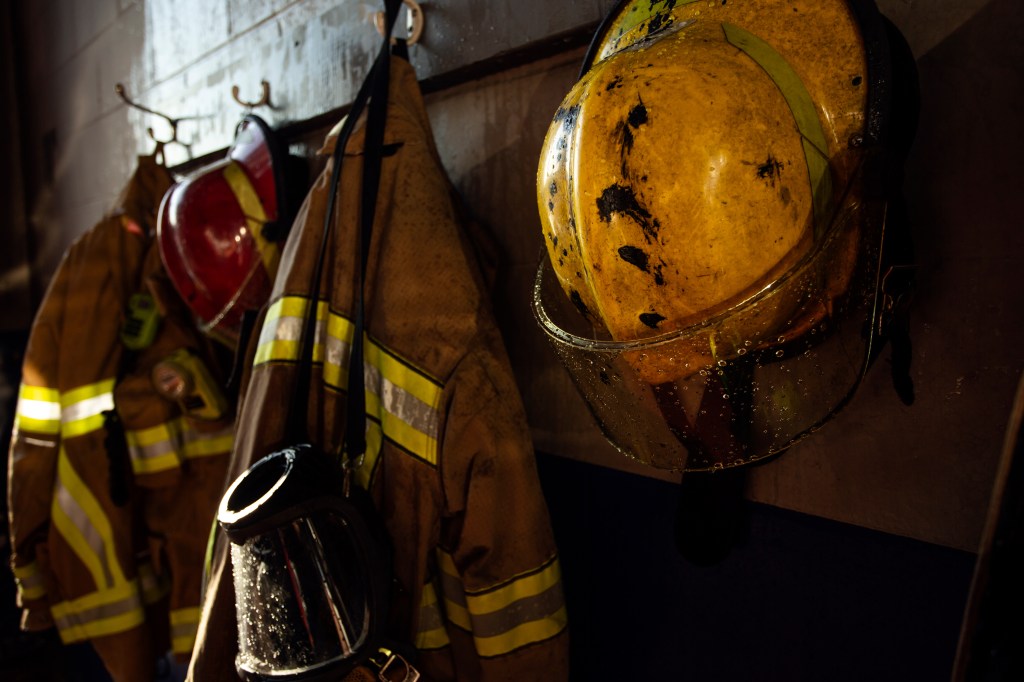
The Role of Firehouses in Preserving History
In recent years, there’s been a shift in how cities approach their structures. Rather than demolishing old buildings to make way for the new, there’s a growing trend of revitalizing and repurposing historical buildings to meet contemporary needs. This movement not only preserves the architectural and historical essence of these structures but also breathes new life into them and transforms the community. Among these structures are historical firehouses that lead to some of the most unique and culturally enriching repurposes.
Repurposed firehouses
Many historical firehouses are being repurposed to suit contemporary needs. These buildings, once symbols of safety and service, are finding new purpose as art galleries, museums, and even trendy breweries. This innovative approach to preservation showcases a deep respect for the past while also adapting them to today’s demands.
In Kentucky, a firehouse on the brink of demolition found a second life as the Grayson Gallery and Art Center. Originally serving as a temporary art space during a city festival, it has grown into a cultural hub where local artists and musicians share their talents.
Similarly, the Denver Firefighters Museum offers a glimpse into the courageous world of firefighting. This repurposed two-story firehouse houses an impressive collection of firefighting memorabilia, thoughtfully curated to educate and inspire visitors. This museum stands as a testament to the dedication of Denver’s fire reserves, who meticulously transformed the space while honoring the building’s past.
These examples underscore a cultural shift toward valuing and preserving our historical heritage. By repurposing historic firehouses and other buildings, communities are weaving the rich tapestries of their past life into the fabric of their future. It’s a movement that reminds us of the importance and memory and place in crafting vibrant cities.
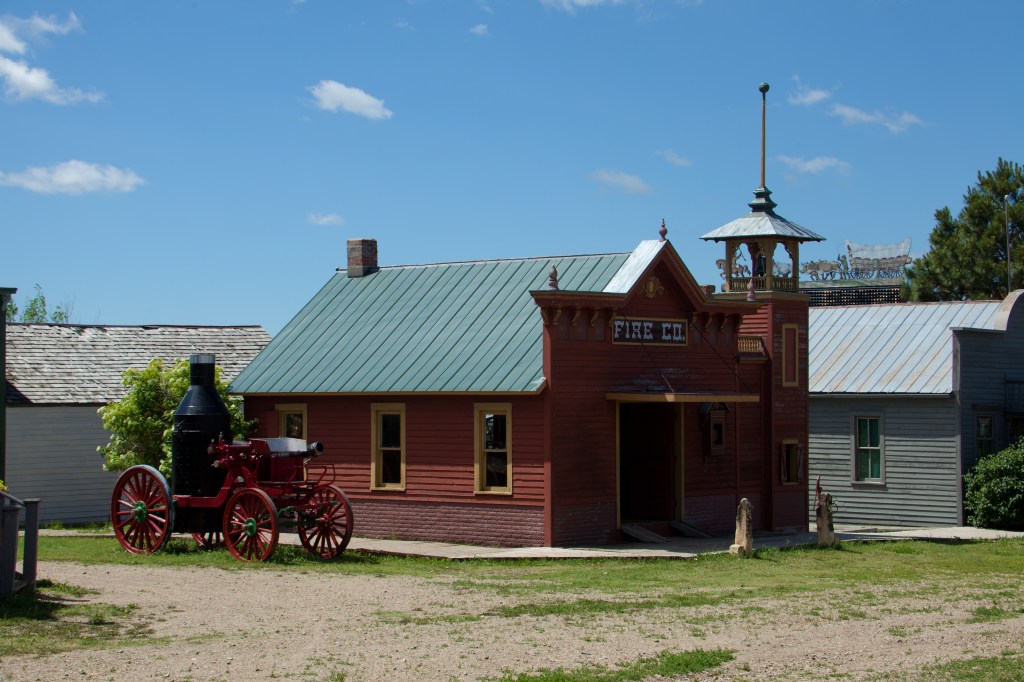
Where to Find Rare Firefighting Memorabilia
Discovering the best places and methods for finding rare and unique firefighting memorabilia can be an exciting journey for any collector. For those passionate about the heroism and history of firefighting, acquiring rare firefighter collectibles not only enriches their collection but also helps preserve the fascinating legacy of fire services. Whether you’re searching for antique fire helmets, vintage firefighting equipment, or unique badges and patches, knowing where to look is the first step in uncovering these treasures.
Sourcing antique fire items
When it comes to sourcing antique fire items, one approach is to delve into specialized online marketplaces and auction sites dedicated to firefighting memorabilia. These platforms often host a wide variety of collectibles, from historical documents and photographs to rare firefighter gear, giving collectors access to a global marketplace. Networking with other collectors through forums and social media groups dedicated to firefighting history and memorabilia can also lead to valuable tips and potential leads on where to find rare pieces, and answers to your questions.
Attending estate sales, flea markets, and auctions in person is another effective method for finding rare firefighting memorabilia. These venues can sometimes surprise you with unexpected finds, especially in regions with a rich firefighting history. It’s also not uncommon for local fire departments to host events or sell off decommissioned items, providing a unique opportunity to acquire authentic and historical pieces directly from the source.
For the dedicated collector, conducting research and connecting with firefighting museums and historical societies can yield dividends. These institutions sometimes offer duplicates of their items for sale or can point you in the direction of reputable dealers and collectors. Moreover, establishing a good rapport with antique dealers who specialize in firefighting memorabilia can ensure you’re top of mind when something special comes their way.
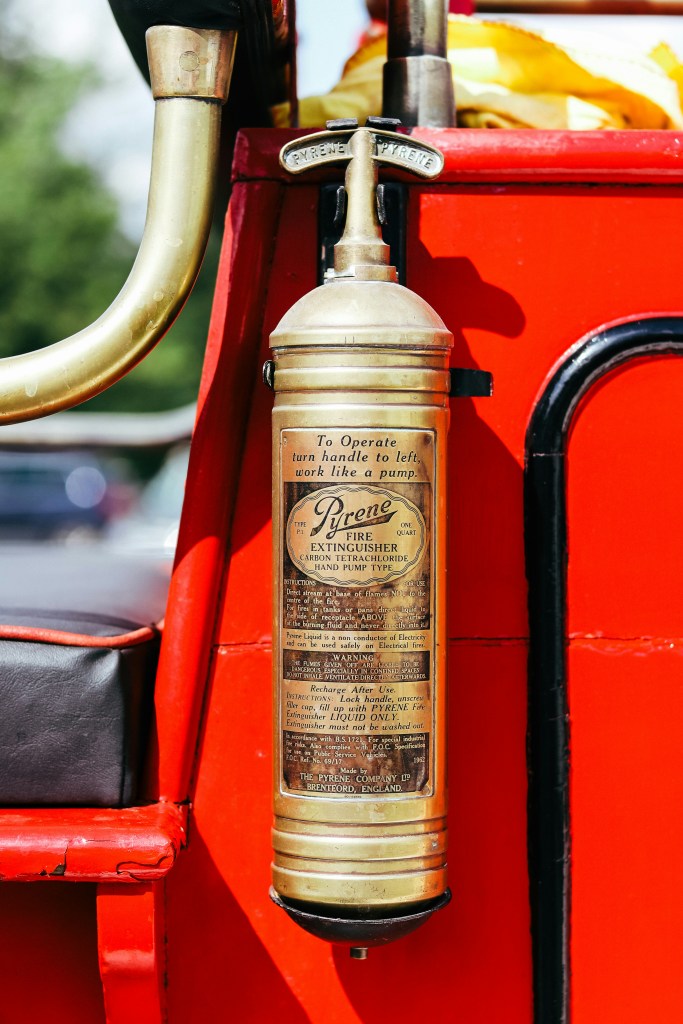
Sources
https://journalofantiques.com/features/collecting-firefighting-antiques-memorabilia/
https://troyproducts.com/a-history-of-fire-apparatus-equipment/
https://www.appraiseitnow.com/blog/appraising-artifacts-and-antiquities-evaluating-historical-finds
https://www.firerescue1.com/firefighting-history/articles/preserving-the-history-of-americas-fire-service-one-brick-at-a-time-ObTBqVUjGx4cK9R9/
https://www.collectorbookstore.com/products/firefighting-antiques-memorabilia
https://www.liveauctioneers.com/news/bid-smart/firefighting-memorabilia-sparks-collector-interest/
About Collectibles Insurance Services
Collectibles Insurance Services has been protecting collections since 1966 and all coverage is provided by a carrier with a group rating of “A” (Excellent) by AM Best, the leading rating agency for the insurance industry.
Comprehensive coverage includes, but is not limited to: accidental breakage, burglary, fire, flood, loss in the mail, theft, natural disasters, and other causes of loss unless specifically excluded from the policy. Deductibles start at $0 for collector policies and we provide coverage for the market value of your collection for losses in excess of $50.
Additionally the protection extends At home and away, and we don't require collection itemization and serial number nor extensive paperwork and red tape.
